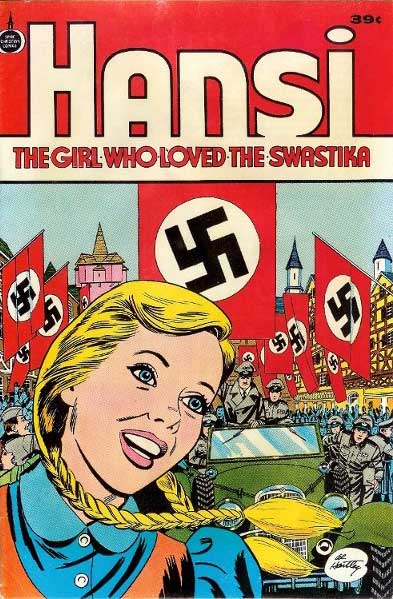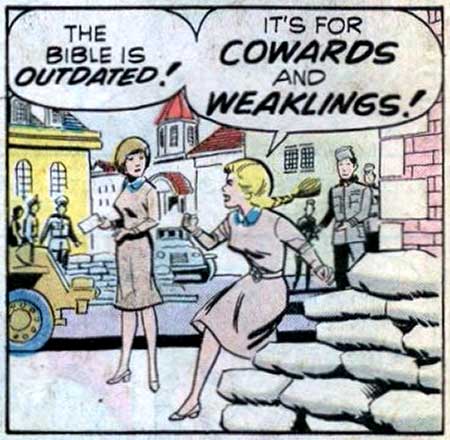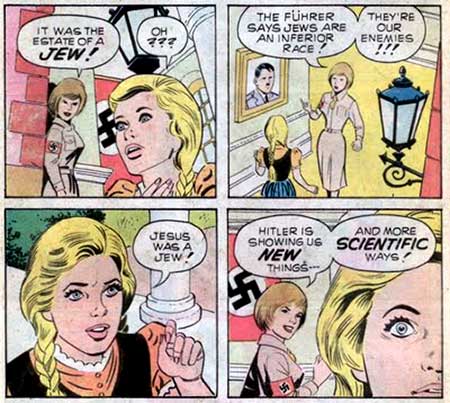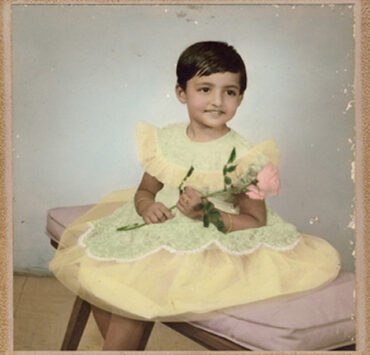If Barbie had smaller breasts, dressed like an early-twentieth-century European country girl, started overdosing on Nazi philosophy, and wanted to marry Jesus, then you would probably get Hansi.

The girl who loved the swastika.
Hansi: The Girl Who Loved the Swastika, written in 1973, is the story of a young girl in Sudetendland, who when the Germans invaded was quite pleased with the recent political development, since they brought books to read. She reads Nazi philosophy and can soon be found lecturing others about how “We are nothing… The Reich is everything!” The obviously blonde, rosy-cheecked girl with blue eyes gets an award for being a good student and gets sent to Prague to become the leader of the Hitler Youth. When the war turns she ends up in a Russian labour camp, where every other woman is raped and she is left alone because she’s too ‘skinny’ for the Russians. Following this she manages to escape and she bumps into a group of gum-chewing American soldiers and is surprised to find that she is well-treated by them. Soon we find our blonde swastika-loving girl reunited with her old love (she doesn’t forget to remind you that she’s still ‘pure’). Once she is reunited with her old boyfriend and they move to America, both their lives are suddenly rejuvenated by the Bible. But upon reaching America she’s shocked at the decadence prevalent there and takes it upon herself to help everyone achieve God—after all America is “one nation under God”.
Hansi isn’t Hitler’s favourite wet dream, neither is she the creation of a deranged Christian nutjob. The comic is actually based on a true story and was part of a series of comics that recorded the lives of famous Christians in the 1970s, including Johnny Cash. The Hansi comic book is based on the autobiography of Maria Anne Hirschmann, who actually lived through most of what is described in the comic. The comic itself was written by accomplished mainstream author Al Hartley who had been drawing mainstream titles including Archie Comics. However, after a particularly moving prayer session he “turned his life over to God—lock, stock, and drawing board”. Soon he was making Christian comic books for Spire Christian Comics.

Hansi starts off believing that “The Bible is outdated” and meant for cowards—this is when she’s going ga-ga over Hitler.
While taking into account the ideology of the publishers, it’s no surprise that the content of the comic book is more evangelical than secular, but there are still certain points about the treatment of the story which I find quite interesting and thought might be worth noting.
Firstly, Hansi never ages. It’s really quite amazing. Even though her story stretches over decades, there is not even a single wrinkle, nothing. Comic book characters rarely age (John Constantine is one of the few who does, but that’s for another article), but one would expect a biographical comic book to respect notions of time and age. The way Hansi has been drawn corresponds neatly with her own assertion of “purity” and her claim that she is the “true bride of Christ”. The fact that she is incapable of ageing is a sign of her purity, even though it does present a slightly disoncerting problem for the reader. For instance she goes into an American prison and relates her war experiences and says, “None of you were born there”, and yet she looks younger than everyone else in the prison.

Combine “Jews are an inferior race” and “Jesus was a Jew”—Christianity is still not faring well in the eyes of Hansi yet.
Secondly, Hansi is too simply swayed over by different ideologies. She is clearly portrayed as intelligent, yet we never see her actively questioning any of the various viewpoints presented to her. First we see her in love with Hitler, then we see her love the Bible, and finally she loves America. It took all of one page worth of inner mumbling for Hansi to rejoice America as her new home, when one of the first lines in the book was, “There will never be anything more precious than this spot, it was your home”. Her homes and her object of love play a significant role in her life, yet the changes in her attitude towards them is so sudden that her story appears highly unconvincing.
The propaganda in this comic book is honestly absolutely fascinating. Take for instance the notion of Hansi’s purity: while everyone is getting raped in the Russian camp during the war, she’s left alone. But at the same time she admits that she is glad that the woman who got raped were “rewarded” by getting shot when they tried to escape.
A comic book written by an organisation that openly claims to be Christian is going to be full of Christian motifs and ideology. Choosing a character who says that she only loved Hitler because “she never knew about the concentration camps” and as a result her eventual realisation of the absolute brilliance of embracing Christianity becomes that much better propaganda.








